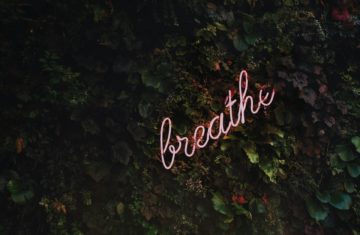If you want to practice Right Action, honor your natural senses.
Throughout my readings on Right Action, I kept running across the idea that a general sense of sobriety and temperance is implied. When we translate the words of the Buddha literally, his admonition against sexual misconduct says to abstain from “abuse of the senses.” That’s an interesting phrase, isn’t it? While sexual misconduct certainly falls under that category, the phrase implies much more. And, more than a set of rules, it implies a way of approaching our humanity.
What if, instead of trying to heighten, numb, or otherwise change our natural senses, we simply honored them as-is?
Our five senses offer us the opportunity to enjoy life fully. We sometimes forget this, because we live in a world that always beckons us toward MORE. Why eat just enough when you can have this HUGE portion?! Why watch a movie in regular form when you can watch it in 3D? And why watch in 3D when you can watch it in Imax? I want to use these more innocuous examples because we don’t need to see these as “moral” decisions to recognize this pattern of pushing our senses. And when we think about it, we know a line exists somewhere along the way where something harmless becomes something unhealthy. Consider the list of seven deadly sins. Many of them can be categorized as crossing over the line of our natural senses: Greed, envy, gluttony, lust. We want more, and at some point, that “more” costs us something.
One of the things it costs us is our ability to discern well. And this is why, I think, a sense of sobriety accompanies the practice of Right Action. How can you choose the wisest thing if you’re high? It’s hard enough to discern well when we’re sober!
Sobriety also relates to the Four Noble Truths. When we seek after thrills in our senses, we allow our desires to run the show. And worse, we do this knowing that even when our desires are met, the fulfillment is fleeting. Buddha compared this to lepers who, in an attempt to lessen their itching, would burn their lesions. Sure, for a few minutes, they found relief. But afterward, they were left with itchy AND burning skin. When we let our cravings lead us, we choose to live in the false belief that something fleeting will provide something lasting. Any recovering addict (of any variety) will tell you this is a lie. Addiction fixes nothing. It adds burns to already itching skin.
If we are ever to be able to implement Right Action, we are going to need to deal squarely with that itching skin first. Itchy skin, of course, can symbolize all kinds of things. Pain, trauma, anxiety, depression, insecurity, fear, self-sabotage. In addition to the lure of the senses on their own, we have so many reasons to indulge in something we believe will ease our pain. But of course, they don’t. There’s no healing in abusing our senses. Only more work to do if we want to get to the root of what’s really happening within us. So in this sense, all abuse of the senses is an act of avoidance. We deny and avoid our natural state because we find it somehow lacking.
If we begin to look at the broad category of “abuse of the senses” as avoidance, we can see why it may be in our best interest to practice staying in the moment, being mindful, sticking with the reality of what is. True mindfulness practice asks us to consider whether our life can be honored just as it is, right now.
When I think about someone who honors his natural senses in an admirable way, I think of Thich Nhat Hanh. He lives such a simple life. Simple food, simple clothing, a routine of service and prayer and kindness. He pays attention to the goodness available in every moment, which is why he can write paragraphs about the joy of eating a tangerine. I know we so often think of sobriety as a kind of prison sentence, as resigning ourselves to a boring life. But we betray the beauty of the natural world when we believe this lie. Real sobriety means being present to the inherent goodness all around us. It means we are awake enough to see it, and wise enough to enjoy it and be grateful for it.
Sobriety, in this way, is spirituality at its core.
This particular form of spirituality may be the most unpopular kind in society. When you think about it, not much in our capitalist framework teaches us to honor our natural senses. There wouldn’t be anything for us to buy! Advertisers wouldn’t have any emotions to tug on that lead to our wallets. On some level, we are beginning to understand this. Recent trends toward tiny houses and simplicity and capsule wardrobes speak to our desire to return to a worldview of enough. We know this stuff doesn’t fix anything. And in our better moments, we actually live like that’s true. (I wish I lived like it was true more often than I do.)
Bhante Gunaratana says, “Cheap thrills cheapen you and degrade your self-worth.” And maybe this above all is why we may want to consider a life approach of sobriety. (Not some rigid dogmatism- a mindful approach.) When we stay with what’s really happening instead of hiding in our sense-seeking missions, we may just gain insight and confidence and self-respect. We may, wonder of wonders, know the Right Action to take in the next moment.
And…we’re worth showing up for. This world is worth showing up for. That natural beauty doesn’t need any outside “boosters” to be worth our attention.
So this week, consider: What senses are you trying to heighten, numb, or avoid? What would happen if you just chose this week instead to honor your natural senses? Where have you allowed yourself to get desensitized to the natural goodness of the world, and how can you get that magic back?
This post belongs to my series on practicing the Eightfold Path. You can read all my posts on Right Action here.
Also, I’m a big fan of the work they’re doing over at Tempest Sobriety School (formerly known as Hip Sobriety). Their approach is that you don’t have to hit rock bottom to decide to make different life choices for yourself. Amen to that. Check them out here.




